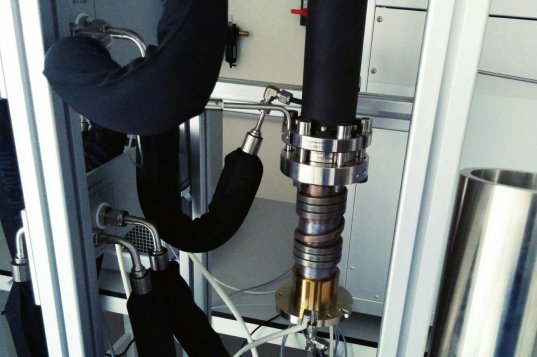Summary
We study the fundamentals of reactive transport processes in porous media, with application ranging from geo-energy applications to industrial gas separations. As such, we deal with systems that possess distinct degrees of disorder in both their chemical and morphological characteristics. We work with a range of materials, extending across commercial adsorbents, rocks, cement and polymers. The research work is thus highly interdisciplinary and develops at the interface between chemical engineering and other disciplines, including material and earth sciences.
We shed light on the mechanisms that govern fluid phase-behaviour as well as single- and multi-phase flows in porous systems by using experiments, mathematical analysis and numerical models across a range of length scales. In this endeavour, we also make use of imaging techniques, such as x-ray tomographic microscopy, optical microscopy and positron emission tomography, to unravel processes that are “buried” within these opaque porous media. We deploy a range of computational methods to reconcile the experimental observations, including models that describe processes in individual pores to formulations that work at the continuum-scale and are therefore better suited to the study of large-scale processes. A major focus of this research is reducing CO2 emissions from industrial processes, including oil and gas extraction from the subsurface and power generation, by incorporating technologies, such as Carbon Capture and Storage (CCS).
Information on my publication records can be found through my ResearcherID and GoogleScholar profiles.
COMPLEX POROUS MEDIA LAB
Opened at the end of 2015, the Complex Porous Media Laboratory is the most recent addition to the QCCSRC research hub at Imperial College London. The lab is dedicated to the study of flow, transport and storage mechanisms in porous systems. Specific research areas include:
- Supercritical gas storage: we use state-of-the-art experimental facilities to study gas adsorption in porous solids at high-pressure and temperature conditions. We develop and apply mathematical models of different complexity to describe the experimental data, including formulations based on the lattice Density Functional Theory.
- Gas adsorption processes: we are interested in a range of industrial applications, including shale gas recovery, hydrogen purification, carbon dioxide capture from flue gas or directly from the air; we study these processes by producing experimental data for the fundamental properties of interest and by combining them with process modelling.
- Chemical transport in porous media: we study a range of problems, including transport in the presence of interfacial processes, such as retention and capillarity, as well as of fluids with complex rheology. Applications include geological carbon dioxide storage, gas separations, enhanced oil recovery. We develop experimental methods to probe the mixing process using three-dimensional imaging techniques, and couple them with numerical models of at different length-scales, including both pore-network and continuum-scale formulations.
- Multiphase flow in porous media: capillarity in disordered porous media is affected by a variety of factors including the structural and chemical properties of the system. We deploy tomographic and optical methods at various length-scales to study phenomena such as gas/oil trapping, wetting and capillary heterogeneity, with specific application to carbon dioxide storage and enhanced oil recovery.
- Digital materials and imaging technology: at the core of some of the experimental methods described above is the development of suitable workflows for image processing and analysis, which varies depending on the material and process under study.

BIOGRAPHY
Since September 2021 | Reader in Chemical Engineering, Department of Chemical Engineering, Imperial College London, UK
2017 - 2021 | Senior Lecturer, Department of Chemical Engineering, Imperial College London, UK
2015 - 2017 | Lecturer, Department of Chemical Engineering, Imperial College London, UK
2013 - 2014 | Assistant Professor, Department of Petroleum Engineering, Colorado School of Mines (CO), USA
2010 - 2013 | Postdoctoral scholar, Department of Energy Resources Engineering, Stanford University (CA), USA
2009 - 2010 | Postdoctoral scholar, Department of Mechanical and Process Engineering, ETH Zurich, Switzerland
2004 - 2009 | PhD (Dr. sc. ETH Zurich), Department of Mechanical and Process Engineering, ETH Zurich, Switzerland
1999 - 2004 | M.Sc. ETH Zurich, Department of Chemistry and Applied Biosciences, ETH Zurich, Switzerland
Publications
Journals
Rovelli A, Brodie J, Rashid B, et al., 2024, Effects of core size and surfactant choice on fluid saturation development in surfactant/Polymer corefloods, Energy and Fuels, Vol:38, ISSN:0887-0624, Pages:2844-2854
Azzan H, Danaci D, Petit C, et al., 2023, Unary adsorption equilibria of hydrogen, nitrogen and carbon dioxide on y-type zeolites at temperatures from 298 to 393 k and at pressures up to 3 MPA, Journal of Chemical and Engineering Data, Vol:68, ISSN:0021-9568, Pages:3512-3524
An S, Wenck N, Manoorkar S, et al., 2023, Inverse Modeling of Core Flood Experiments for Predictive Models of Sandstone and Carbonate Rocks, Water Resources Research, Vol:59, ISSN:0043-1397
Ward A, Li K, Pini R, 2023, Assessment of dual-adsorbent beds for CO2 capture byequilibrium-based process design, Separation and Purification Technology, Vol:319, ISSN:0950-4214
Conference
Wedler C, Ferre A, Azzan H, et al., 2023, Competitive high-pressure adsorption of CO2/CH4 mixtures on NIST reference zeolite Y (RM8850), Thermodynamik Kolloquium 2023

